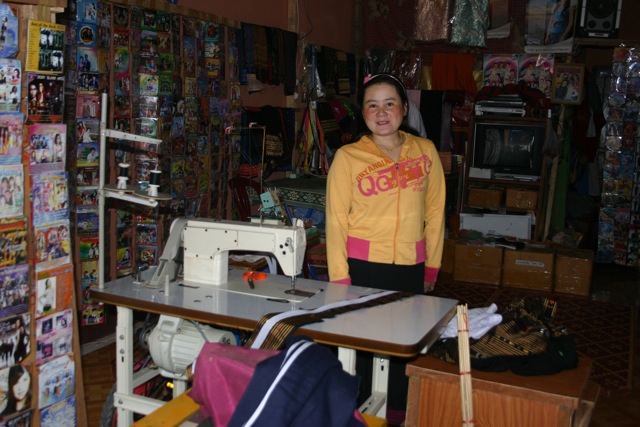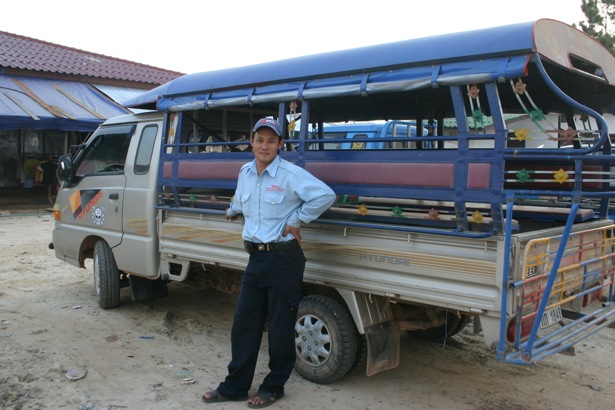Aspirations
Vientiane – Lao People’s Democratic Republic
Eighty five per cent of the people in Laos practice subsistence agriculture in which they consume almost everything they produce and have little surplus to sell for cash. Those Lao who work for wages accept pay that most Americans would consider extraordinarily low. In most places throughout this country it’s easy to hire laborers who will put in a full day’s work in return for 30,000 kip, less than four dollars in American money.
Men and woman employed by bomb and landmine clearance companies constitute one of the highest paid occupational groups in Laos. It’s common for clearance companies to pay entry-level de-miners about eight dollars a day (truck drivers a bit less, experienced technicians a bit more). The most skilled clearance workers, those serving as team leaders or field managers, may earn more than three times the starting wage.
In addition, clearance workers are provided food, housing, uniforms, and periodic travel money to their home villages. Most companies pay medical expenses for work-related injuries and illnesses.
All of which is to say that clearance work, while dangerous, is well paid relative to Lao standards. Clearance companies here could easily hire, as field medics, Lao doctors eager to double or triple their annual income. Many Lao schoolteachers, who typically earn less than 40 dollars a month, would, if invited, eagerly leave the classroom and become de-miners.
Over the past four years I’ve watched hundreds of clearance workers collect their wages and spend their money. Some have little to show for their years of dangerous work. But most…by far the most… have steadily improved their family’s quality of life. A few, the most ambitious and frugal, are poised to enter stations in life that their parents could only dream about.
Typically, when a de-miner discovers the pleasure of discretionary income, the first major purchase out of saved wages is a motorbike. The next major item acquired will probably be a convenience item for the home, perhaps a small refrigerator or television.
Recognizing that it takes money to make money, an enterprising employee might hoard savings with the goal of capitalizing a business for a spouse or other relative. It might be a simple food stall selling noodle soup or fried rice. Or, it could be a tiny shop stocked with cigarettes, soap, laundry detergent, soda, beer and other beverages. Or, it could be a more ambitious enterprise, where a family member can ply a skilled trade. Perhaps a beauty salon or tailor shop: a place with low overhead that offers a quick return on investment and labor.
Some of my Lao friends have grander aspirations than do others. They squirrel away their pay and defer pleasures. They eat cheap and sometimes conveniently disappear when its time to divvy up the bar bill. In essence, they sacrifice the present to achieve a better future.
Recently, during lunches in the field, I’ve been asking workers about their ambitions. Here’s a sampling of goals that some of the guys are working for:
Khonsavahn got married two years ago and has built a new house. Since Khonsavahn has a reputation as a tightwad, everyone assumed he was saving money to build a grand residence. To everyone’s surprise, his new home is small, made of inexpensive materials and is modestly furnished. He clearly held back and built less than he could afford.
Khonsavahn told me that his wife is due to have a baby this spring, so he’s trying to set more money aside. In addition, he still has younger siblings at home and he feels responsible to help them with the cost of their schooling.
Orathai is also building a home, but not in the area where he has been working for several years. His new house is in Mahaxai District in a village that Orathai says he will always consider home. That’s a clue that, although still young, Orathai is already planning for a time when his work with bombs and landmines will end.
Unlike Khonsavahn, Orathai’s not cutting corners. The guys who have seen the house say it’s both large and solidly built. With brick walls, cement floors and a steel roof it is, no doubt, the grandest house in his family’s history.
The house is right across the street from a big cement factory and Orathai jokes that when he finally gives up on bomb removal he’s going to work in the factory: no more working far from home and only seeing his family on holidays.
Kham didn’t plan to fall in love and he’s slightly mystified that it happened to him. He was truly enjoying bachelorhood. And then, wham! Something hit. Now he’s trying to save enough money to follow through with his engagement to a nurse back home. He figures he needs about $5,000 for his bride’s dowry and their wedding celebration. In Laos, wedding expenses are traditionally borne by the groom’s family. Kham admits to doing some hardheaded calculation, figuring the cost of entertaining guests against the gift money he might receive. With a little bit of luck he could break even, but he’s quick to add, “One never knows for sure”.
Liam bought a sewing machine and set his wife up in business as a seamstress. He rents a small shop in a village market where she can receive customers and do her sewing. To make the best use of space, Liam has filled the shop with displays of cheap, pirated copies of Thai movies and music CD’s that his wife sells to her sewing customers and various passersby.
With saved wages and profit from his wife’s shop, Liam was able to buy a small, used, pickup truck that he rents out to a local driver during the workweek. Then, on weekends, he uses the truck himself to transport people and goods for pay.
If you are doing the same math as I am, that all means that Liam, his wife, and his truck are all working seven days a week. Baring some very bad karma, Liam and his extended family are headed toward the best days of their lives.
Sanka’s father died and left him several acres of land near his home village in a province down south. His dream is to clear the land, establish a rubber tree plantation and, seven or eight years after planting, start living off the annual harvest. He needs about $300 to employ scrub cutters to clear the land of brush. Then, he’ll need cash (a lot more than he has saved now) to buy 2,000 rubber tree saplings that he’ll plant by hand himself.
Earlier this year Sanka cleared a small area and actually planted his first 200 trees. Unfortunately, over the summer his brother became ill and Sanka had to use his dream money for hospital care. The doctor says there is nothing to be done about his brother’s kidney condition and that all Sanka’s family can do is wait for the young man to die. Sanka doesn’t wish for his brother to die soon, but he ruefully acknowledges that medical bills could cost him his rubber plantation.
Done wants to start a pig farm. He plans to start small, limiting his initial investment to 20 sows. Then, with the services of a good boar, and just a bit of luck, he could see his herd grow quickly. As a sideline, he plans to enlarge his garden, using pig manure to enrich the land and increase his harvest of grain and vegetables so he’ll have a surplus to sell in the local market.
Oumath also wants to raise livestock, but he is aiming higher and plans to move faster than Done. Oumath’s father died and left him some valuable real estate in Vientiane, land that was once on the far edge of town but is now in an area with rapidly rising land values.
Oumath plans to sell his inherited land in the city and use the proceeds to start raising cattle in the countryside. He envisions a herd of 200 cows, right from the get-go. Of course, it will take his entire inheritance to buy the land and all those cows. In fact, he admits he may also need a bank loan to close the deal.
Oumath’s friends all caution him against betting all of his chips on his first hand. They advise him to start with a single bull and just a few cows and then build his herd over time. Oumath, on the other hand, is taking a “no guts, no glory” approach. He figures that he’d rather go for broke with the chance of early riches, than to go at the endeavor half-hearted and settle for a modest profit. The guys have told Oumath a lot of sad stories about dead cows but he refuses to trim his dream down in size.
Moan claims to be saving for a powerful motor for his new boat. Then, like some of his neighbors, he can start doing some serious fishing in the new reservoir. Not just food for his table; food for the market place. In fact, maybe more fish than the local market can handle; maybe enough fish to make it worth hauling them to the pricier markets in the provincial capitol.
The other guys doubt that Moan is serious about this plan since he’ll have to net a lot of fish to earn anywhere near to money that he now makes as a deminer. Still, Moan enjoys daydreaming about the easy life that he thinks fishermen live.
Sith is a bit worried about his old age. Not that Sith is going to get there any time soon; he’s only in his mid thirties. But, he has only two children, a son and a daughter, and he doubts that he and his wife will have more.
In Laos, sons marry and go live with their wife’s family, so that will put the burden for his care, when elderly, on his daughter. Sith wonders whether she will be up to the task, and also questions whether it will be fair to burden her with such responsibility. So…Sith is working on a strategy that will give him independence in his old age.
His plan is to live with his extended family for the foreseeable future and forego buying a house of his own. Instead, he will use his savings to buy several small houses around the city that he can divide into rooms for boarders. He figures that there is always a good market for cheap rental rooms and that as his real estate holdings increase, he’ll have an ongoing income stream that will let him live comfortably in the years when he and his wife can no longer work.


